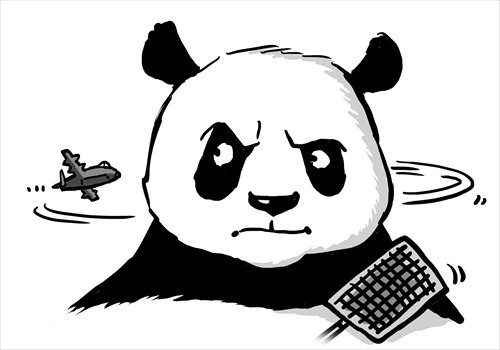HOME >> OP-ED
Surveillance spoils military engagement
By Ding Gang Source:Global Times Published: 2014-8-27 19:43:01

Illustration: Liu Rui/GT
Chinese and US military officials have been holding talks about rules of behavior at the Pentagon in recent days.
The meetings are aimed at implementing the agreement reached by the leaderships of the two countries and pushing forward a military security code of conduct covering international waters and airspace.
Ahead of the meetings, there was a near collision between a Chinese fighter plane and a US surveillance aircraft over the South China Sea. The US claimed that its patrolling aircraft was conducting routine reconnaissance operations, while China said it was conducting routine identification and verification.
China's response to the reconnaissance operations of the US jet is reasonable and justified. The US should not assume that today's China will turn a deaf ear to outsiders who spy on it. Any country that has counter-surveillance abilities will do as China did.
The latest incident over the South China Sea reflected the true phase of the current Sino-US relations, and exposed the obstacles that hinder the development of this bilateral relationship.
The near collision happened about 217 kilometers east of China's Hainan Island and very close to China's airspace. During a press conference held by a spokesperson of the US Department of State, a reporter from Hong Kong's Phoenix TV asked, "Is it okay if China sends their fighter jets to Hawaii transparently?" The US avoided giving a direct answer.
This reminds people of the case in 2001 when a Chinese fighter jet collided with a US surveillance plane, about 100 kilometers off Hainan Island.
At that time, China and the US hadn't established a military hotline or a crisis management mechanism.
Joseph Prueher, then US ambassador to China and former US Pacific Command, said he couldn't get China's Ministry of Foreign Affairs to pick up his calls for nine hours after the incident took place. And since then, both have realized that it is at China's doorstep that the two are most likely to clash.
With the "pivot to Asia" strategy, the Obama government has plunged more military investment into the region, which intensifies China's anxiety over possible clashes.
The White House and the Pentagon have repeatedly said that the US doesn't view China as a rival and would not take containment policies.
But the truth is clear. The US even expanded the scale and frequency of monitoring and inspecting China.
The US warships and fighter jets get closer and closer, north to coastal areas around Dalian and south to Hainan Island, now covering the Yellow Sea, the East China Sea and the South China Sea.
According to Chinese military insiders, US jets carry out close reconnaissance on China about 500 times every year and they will stay for quite a long time.
Who would believe that the target of the reconnaissance of such a scale is a country that the US is to establish a new type of major power relationship with?
The US actions have not only destroyed the mutual trust between China and the US, but also tarnished its own international reputation.
Such a scale of reconnaissance also deepens the doubts of both militaries toward each other's strategic objectives and may hurt the bilateral military exchanges that are still in their infancy.
Such stunts over the South China Sea should not become a normal state. Both China and the US should mark their boundaries and set up necessary rules.
Currently, the two have been trying to establish a crisis management mechanism and strengthening contacts between militaries. The meetings can serve as a catalyst.
But at the same time, the two should also make efforts to reduce chances for such crises.
When conducting military actions, one should take into consideration the feelings of the other.
China cannot stop US reconnaissance, but can take countermeasures. If the US is sincere about building up a major power relationship with China, it should adopt a more restrained manner.
The US should take the initiative to get closer to China, rather than pushing it away.
This will not hurt US core interests, but will enhance mutual trust with China.
The author is a senior editor with People's Daily. He is now stationed in Brazil. dinggang@globaltimes.com.cn. Follow him on Twitter at @dinggangchina